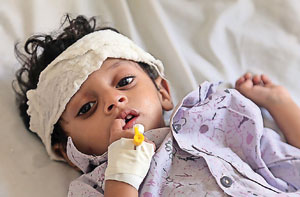Sunday Times 2
UN accused of sanitising killings of children in armed conflicts
UNITED NATIONS (IPS) – The horrendous killings of children in military conflicts and civil wars – both by national armed forces and militant groups – have triggered widespread condemnation by human rights organisations worldwide.
But a “list of shame” singling out some of these perpetrators has been politicised leaving out some of these countries under fire, including Afghanistan, Israel (in the killings in occupied territories), Somalia and Yemen (where the killings are blamed on the aerial attacks by Saudi Arabia and the United Arab Emirates).
According to Human Rights Watch, UN Secretary-General Antonio Guterres has been repeatedly criticised for letting national armed forces and non-state armed groups off the hook for grave violations against children in war.

A war wounded Yemeni child receiving treatment in a hospital. AFP
The list, first requested by the UN Security Council in 2001, is described as the “linchpin” for UN efforts to protect children in war.
The numbers, however, are staggering, according to a new report released by the Eminent Persons Group which includes Lt-General (Ret) Romeo Dallaire, the former UN force commander during Rwanda’s genocide; Yanghee Lee, former chair of the UN Committee on the Rights of the Child; Benyam Dawit Mezmur, a child rights expert; and Allan Rock, former Canadian ambassador to the United Nations.
The group, which released its report last week, has numerous examples of armed forces or groups (typically government forces) that have been omitted or removed from the “list of shame” — notably the Saudi and UAE-led coalition, Israeli forces, Afghan forces, and Myanmar’s military, Tatmadaw
Afghan security forces have reportedly killed or injured more than 4,000 children since 2014 but have not been listed.
In 2014, Israeli forces killed 557 Palestinian children and injured 4,249, largely during fighting in Gaza. But Israeli forces were not on the list of shame — even though the number of children killed was the third highest in the world that year.
In Somalia, the armed group Al-Shabab has been repeatedly listed for sexual violence against children, but the Somali National Army has not been listed, despite comparable numbers of cases.
In 2020, Guterres “delisted” the coalition led by Saudi and United Arab Emirates for killing and maiming children in Yemen, as well as Myanmar’s army for recruiting and using child soldiers.
Yet each was responsible for hundreds of violations the previous year, according to the report.
Jo Becker, Advocacy Director, Children’s Rights Division at Human Rights Watch (HRW), told IPS that Guterres has been reluctant to hold all perpetrators to account since he first took office about four years ago.
Asked whether Guterres is paying politics in a year he is seeking re-election, Becker said: “So his failure to list all perpetrators is definitely not just an issue of this being an “election year.”
She said the UN Security Council first requested the annual list, and over the past two decades, has carefully created the UN’s framework for children and armed conflict.
As the architects of the agenda, they should insist that the Secretary-General ensure it functions as it was intended, and that he lists all perpetrators, without exception, Becker declared.
But without an accurate list, the UN’s children and armed conflict framework is seriously undermined. The experts urged the secretary-general to change his approach and list all perpetrators “without fear or favour.”
Without such action, they warn, children will be put at even greater risk, said HRW. “The secretary-general should take the experts’ recommendations to heart and put the protection of children first”.
Mouin Rabbani, Senior Fellow with the Institute for Palestine Studies and Co-Editor, Jadaliyya, an independent ezine produced by the Arab Studies Institute, told IPS it doesn’t take more than a passing glance at the list of perpetrators included in, and excluded from the list, to understand that these assessments are not the product of a rigorous examination of the evidence, and thus do not represent the conclusions of an appropriately professional process.
“It seems to me indisputable that political factors are in play. In part this consists of the traditional deference to the powerful and their clients, which is compensated for with sanctimonious outrage — which would otherwise be justified — against the weak and marginalised”.
In part, he argued, it reflects electoral considerations, with Guterres gearing up for election to a second term. And in part it reflects financial concerns, with the UN continuing to suffer a budget crunch and the kingdom of Saudi Arabia being once again given a pass.
While there is much discontent with the glaring omissions in the list, which no one has failed to notice, it seems unlikely that the General Assembly will act to rectify, since it is composed of governments and many of them are subject to similar pressures and inducements, said Rabbani.


